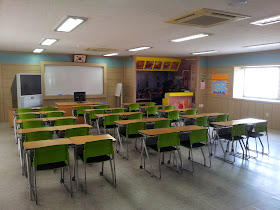We met together for the first time today. I originally wanted just 8 students, but the demand was high and my arm was twisted into bumping the number up to 10. I felt terrible about turning some of the lower level students away, but I wanted to work with higher level students. It will allow me to try things I can't do in my normal classes and since I have no Korean co-teacher I have to manage the class without their translation assistance.
Today I asked the students to choose a western name and I gave them the opportunity to ask me some questions. Since the students were drawn from many different classes I made them learn 6 things about another student and introduce that student to the class. It went well.
Next up, prepositions! I've wanted to do this activity for a long time, but in my normal classes I have to be very mindful of not making it too difficult and keeping everyone involved. Students had to describe the secret picture I gave them to their friend, and the friend had to follow the instructions and draw the picture. We did a practice run together as a class on the whiteboard before I let them loose. I was presently surprised by the results.
The small picture at the top is what they had to describe to their friend, below it is the student drawing.
Ok, this one wasn't so good. But they gave it a go.
Not a bad effort.
A couple of great efforts here.
I'm looking forward to the next class.

























